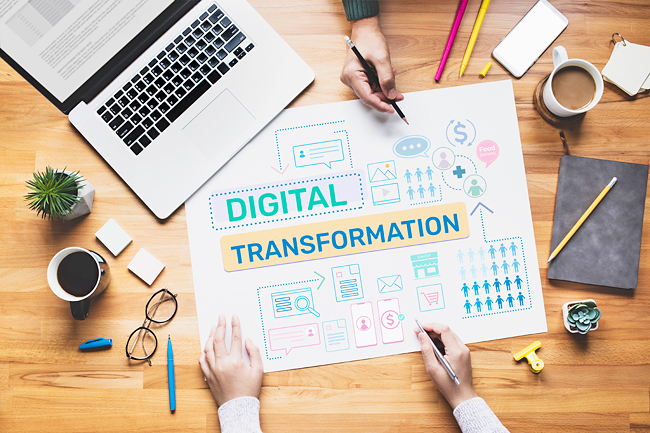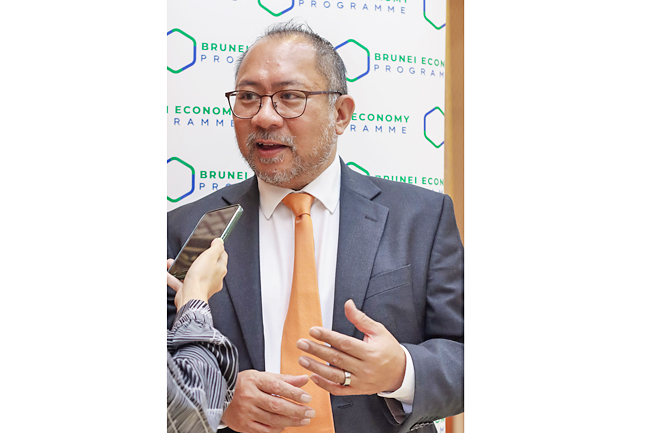Izah Azahari
There are tremendous opportunities for Brunei Darussalam, as a member of the Regional Comprehensive Economic Partnership (RCEP) and participating in the Comprehensive and Progressive Agreement for Trans-Pacific Partnership (CPTPP), to extend ideas, views and gain from others through these various platforms, including the Association of Southeast Asian Nations (ASEAN) and the Asia-Pacific Economic Cooperation (APEC).
This was said by Pacific Economic Cooperation Council Secretary-General Eduardo Pedrosa during a recent interview with the Bulletin.
The secretary-general was in the Sultanate to speak in a panel discussion during the National Business Conference 2023 held at the International Convention Centre (ICC) in Berakas on February 2.
Regarding what Brunei could further focus on to see growth, the secretary-general believes that education is critical.
Eduardo also set the scene before the panel discussion, highlighting global challenges impacting the region, such as inflation, supply chain issues, and currency fluctuation.
He highlighted that the regional outlook for 2023 is greatly affected by external events such as the ongoing conflict in Ukraine, global inflation, rising interest rates, and a possible slowdown in the United States.


The secretary-general added that there is also the re-opening of China that had been anticipated worldwide.
“We’ll have to see what impact that will have on things such as commodity prices and the ability of the supply side to respond to demand, and hopefully, that will alleviate some of the supply chain pressures,” he said.
During the panel discussion, digitalisation was one of the main focus topics, to which the secretary-general explained that what was seen throughout the pandemic was the ability of digitalisation to allow everyone to continue with daily life, even while everything was
shut down.
“If you think of it this way, can you imagine going through the pandemic 25 years ago before the Internet? Without those platforms, you wouldn’t be able to communicate so easily with friends, talk to colleagues overseas, or even around the neighbourhood.”
Eduardo said digitalisation had enabled many businesses to have business continuity throughout the pandemic, as people couldn’t go out as much. While digital e-commerce has been tremendously important, digitalisation has also proven its importance for school children.
“While most schools were closed, education services were delivered online. It wasn’t ideal, but at least there was still a continuity of education throughout that period.”
As we move forward, the secretary-general said what needs to be thought about is the types of services that will be delivered digitally and whether or not we are ready for it globally.
Other questions related to the matter would be looking at whether or not the infrastructure is in place, as well as whether a country has the capability and the risks of being digital.
Further elaborating on the possible risks of digitalisation, the secretary-general highlighted that the world had seen a massive increase in cyber-security attacks over this period, and many have to be aware of all the scamming schemes that are getting increasingly complex.
“There’s a need for a lot of socialisation and education of consumers and businesses on how to react to these things, and ensure they aren’t opening the door and letting personal information out.”
He added that this is related to privacy and cyber-security laws, how those issues are being dealt with, and this matter would have to be cross-border as the Internet is global in aspects of where data is stored and more.
With the rollout of 5G globally, Eduardo said that it had tremendous industrial application processes so that industrial applications could be controlled remotely, making it a whole lot easier, decreasing latency, and increasing reliability.
However, the secretary-general believes that we have yet to fully explore the full potential of 5G, as the world has only seen a little bit of what it can do through the pandemic. Still, most of the people were using Zoom through hard connections at home during that period.
“5G would enable you to make these connections remotely anywhere you are. That’s something it can afford to do. Other aspects of that, I don’t think we’ve even touched the tip of the iceberg.”
He also noted that the whole aspect of the Internet of Things (IoT) is how individuals can remotely connect to different devices and control those devices at home.
Nevertheless, with anything new, the secretary-general also said there would be drawbacks such as cyber-security and its risks.
“You’re not necessarily securing your fridge, but your fridge could be a point of vulnerability in your home network. People can get control of everything within your home network through an IoT device, so you have to be very careful about it.”
On standardisation, he said that products need to be standardised to make sure they are appropriately secured to ensure devices will not become a backdoor into a person’s home network.
“There is a lot of uncertainty in energy markets. So while the general prices of crude oil and gas are levelling up, people are still looking to secure long-term contracts to avoid any kind of risks we saw over the last year,” he said.


